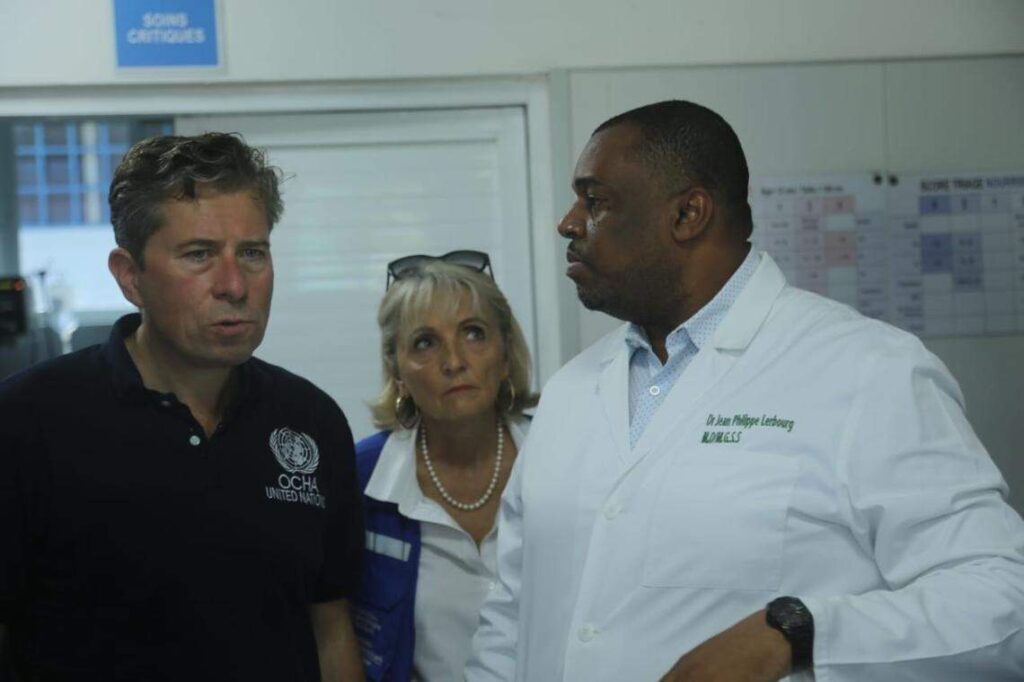PORT-AU-PRINCE — The United Nations on Tuesday allocated an additional $9 million in emergency funds to Haiti amid the country’s worsening gang violence and a growing hunger crisis.
The funds were directed by Tom Fletcher, the under-secretary general for humanitarian affairs and emergency relief coordinator, after he spent the day visiting a site packed with 5,000 people forced to flee from their homes and the only public hospital still functioning in a capital largely in the grips of armed gangs.
At L’Hôpital Universitaire La Paix, Fletcher found a well-run, pristine facility where nurses and doctors cared for malnourished children and women in labor. But he also heard about funding challenges, including how the last affordable healthcare option for most Haitians may soon be hitting a critical junction.
It could lose most of its emergency ward staff by the end of the month.
“It would be heartbreaking if this hospital that so many people depend on, the only functioning hospital in this area, were to cease to function when they’ve done such immense work with such courage and tenacity, and expertise to make it work,” he said. “We cannot fail here.”
Fletcher, in charge of the UN’s humanitarian crisis response, arrived in Haiti on Monday with several goals. He wants to see for himself the effects of Haiti’s gang violence, which is driving people from their homes, leaving millions hunger and exposing girls and women to attacks.
He also wants to determine what more the U.N. can do as it deals with its own budget cuts. His visit comes as the U.N. faces shortfalls from foreign aid donors, including the United States. As a result, Haiti’s humanitarian crisis, with half the population estimated being hungry, is the least funded in the world.
“When you look at where the red lights are flashing, the warning lights are flashing,” he told the Miami Herald in an interview at the end of his visits. “it’s often around those big gender-based violence, protection of women and girls programs in these more neglected crises and so that’s the logic of using these emergency funds.”
As he toured La Paix, located not far from areas recently under gang attacks, Fletcher heard not just about how the spiraling crisis, but also about how agencies within the U.N. system like the Pan American Health Organization and UNICEF were working with Haitian authorities to provide healthcare. PAHO, for example, provides essential medicines and health supplies, and allows for some of the most vulnerable to receive free healthcare, while UNICEF has improved access to care and nutrition services with the rehabilitation of the hospital’s pediatric unit.
Still, the threat of impending budget cuts couldn’t be ignored.
“It’s really terrifying,” Fletcher said, adding that he was “really impressed with the way the hospital was run, organized.”
Haiti’s health system has long been on life-support. But with more than 1.3 million internally displaced by armed groups, and half of the population hungry, the system is buckling under the pressure.
Healthcare workers are routinely kidnaped and ambulances targeted and looted. Gang attacks have forced the closure of most hospitals across the capital, including its largest public hospital, the Hospital of the State University of Haiti, also known as the General Hospital. It served the majority of the population until repeated looting and attacks by gang forced its closure last year.
La Paix, the staff told Fletcher, has been the one lifeline – even with its lack of modern equipment and dependence on generators for electricity. The hospital performs nearly 3,600 surgeries annually. The emergency department last year, alone had more than 20,600 cases, a 43% increase in cases from the previous. Nearly all are trauma-related emergencies.
It was here journalists were rushed to in December when they were ambushed during a press conference called for by the health ministry, and it’s where injured policemen are routinely provided with healthcare. Its neighbor is one of the largest displacement camps, the former public health ministry now home to 5,000 people forced out of their homes by armed gangs.
“Whatever the social category of …those who are victims,” Dr. Paul Junior Fontilus, the director general said, “when we arrive at the operating room, the person is operated on.”
For Fletcher, who started the day hearing the desperate pleas of displaced Haitians, La Paix is one more reason why the world needs to care, should care abou the unfolding crisis in Haiti. “When you come to a hospital like this that is well-run, efficient, it’s hugely encouraging,” he said afterward. “Every day here you are seeing thousands of people getting treatment.
“Women who suffered horrific sexual violence are giving birth,” he added. “Men who are coming with bullets in their chest. Kids who are malnourished and treated. But all of this is in jeopardy because of crucial funding that will run out at the end of September.”
In announcing the additional funds on Tuesday, Stéphane Dujarric, spokesman for Secretary General António Guterres told journalists the money from the U.N.’s Central Emergency Response Fund is to help the U.N. and its partners step up life-saving support to the most vulnerable, including those who have fled their homes and host communities in the Center and Artibonite regions.
“They are facing acute shortages of food, water, shelter, healthcare, sanitation and protection,” Dujarric said.
“This additional funding comes at a critical time, with the humanitarian response continuing to face drastic shortfalls,” he noted. “Only $105 million of the $908 million required for the Haiti humanitarian appeal have been received.”
By JACQUELINE CHARLES/Miami Herald
Jacqueline Charles has reported on Haiti and the English-speaking Caribbean for the Miami Herald for over a decade. A Pulitzer Prize finalist for her coverage of the 2010 Haiti earthquake, she was awarded a 2018 Maria Moors Cabot Prize — the most prestigious award for coverage of the Americas.

